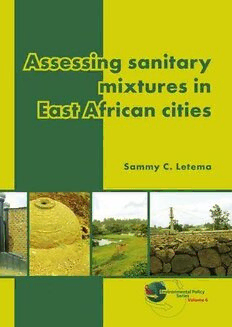
Assessing Sanitary Mixtures in East African Cities PDF
Preview Assessing Sanitary Mixtures in East African Cities
Assessing sanitary mixtures in East African cities Sammy C. Letema Environmental Policy Series Volume 6 Assessing sanitary mixtures in East African cities Assessing sanitary mixtures in East African cities Sammy C. Letema Environmental Policy Series – Volume 6 Wageningen Academic P u b l i s h e r s Buy a print copy of this book at www.WageningenAcademic.com/EPS-06 The research for this PhD thesis was performed at the sub-department of Environmental Technology (Prof Jules B. van Lier, promotor) in cooperation with the Environmental Policy Group (dr Bas van Vliet, co-promotor) at Wageningen University. This work is subject to copyright. All rights are reserved, whether the whole or part of the material is concerned. Nothing from this publication may be translated, reproduced, stored in a computerised system or published in any form or in any manner, including electronic, mechanical, reprographic or photographic, without prior written permission from the publisher: Wageningen Academic Publishers P.O. Box 220 6700 AE Wageningen The Netherlands ISBN: 978-90-8686-215-3 www.WageningenAcademic.com e-ISBN: 978-90-8686-769-1 [email protected] DOI: 10.3920/978-90-8686-769-1 The content of this publication and any liabilities arising from it remain the First published, 2012 responsibility of the author. The publisher is not responsible for possible © Wageningen Academic Publishers damages, which could be a result of content The Netherlands, 2012 derived from this publication. Assessing sanitary mixtures in East African cities 7 Preface Many intervention measures have been sought in the past to address sanitation challenges, but largely the approaches have been characterised by a clash between centralised and a decentralised approach. Sustainability assessment has also been characterized by a dualistic approach, between the techno-centric and the eco-centric. The dualistic dichotomy in sanitary provision is often reduced to competition between the proponents, none of them providing a panacea for solving complex sanitary challenges. Such opposing views are often simplistic and not in tandem with the existing multiple sanitary options and service providers in East African cities, which defy such classification. This thesis, therefore, provides the theoretical and empirical basis for a third way of classifying and assessing the multiple technical and institutional options to sanitary provision. This novel assessment approach called ‘modernised mixtures’ is used in this thesis as a tool for conceptualising, assessing and improving sanitary provision in East African cities. The approach is an inclusive way of assessing sanitary mixtures, which benefits decision making among imperfect options. The research described in this thesis was financially supported by Partnership Research on Viable Urban Environmental Infrastructure Development in East Africa (PROVIDE), a project funded by Interdisciplinary Research and Education Fund (INREF), Wageningen University, The Netherlands. I thank the PROVIDE team, Spaargaren, Oosterveer and van Buuren, who came to East Africa in 2006, for showing confidence and picking me as a PhD candidate under PROVIDE project. I am grateful to Jules van Lier, my promoter, for his support and flexibility in the direction of research and write up of the thesis. My sincere gratitude goes to my co-promoter, Bas van Vliet, for his guidance, belief and inspiration. My appreciation goes to Joost van Buuren for his technical advice and sharing experiences. My appreciation goes to administrators Corry Rothuizen of Environmental Policy and Liesbeth Kesaulya of Environmental Technology for their administrative and logistical support during my entire PhD period. My appreciation to my wife Elizabeth and children for their moral support and deep understanding when I was away most of the time. My appreciation also goes to my PROVIDE colleagues: Aisa, Christine, Fredrick, Judith, Mesharch, Tobias, and Richard, and PROVIDE affiliate, Leah. Being with you people made my stay in Wageningen home away from home. During the course of my stay in Wageningen I made great friends: Gabor and Lina (Environmental Technology), Marjanneke, Dorien, Carolina, Jennifer, Elizabeth, Natapol, Kim, Harry and Hilde (Environmental Policy), Maren (Development Economics), Bing (Logistics), Nelly (Socio-Spatial Analysis) and Kibor (Plant Sciences). The get-together, dinners and lunches are highly appreciated. Marjanneke, I will always remember the Fellowship of the Movies and Nelly your company to church and bicycle rides. Assessing sanitary mixtures in East African cities 9 Table of contents Preface 7 Abbreviations 13 Chapter 1. Introduction 15 1.1 Background 15 1.2 Urbanisation and sanitation provision status in East Africa 17 1.3 Variety of sanitary scales and institutional arrangements 18 1.4 Research objectives and questions 19 1.5 Operationalization, limitations and methodology 20 1.6 Thesis structure 21 Chapter 2. Modernised sanitary mixtures: a paradigm shift in sanitary provision 23 2.1 Introduction 23 2.2 Modernisation and modern infrastructural ideal 23 2.3 Spatial-technical dimensions of sanitary provision 24 2.3.1 Paradigms of centralisation and decentralisation 24 2.3.2 Scale 27 2.3.3 Flows 28 2.3.4 Mixed sanitary solutions 28 2.4 Institutional dimensions of sanitary provision 29 2.4.1 Public utility provision 29 2.4.2 Private utility provision 30 2.4.3 Voluntary sector utility provision 31 2.4.4 Partnership utility provision 31 2.4.5 End-user participation 33 2.5 Modernised sanitary mixtures as a flexible mix of technical and institutional dimensions 34 2.5.1 The MM approach 34 2.5.2 The MM dimensions 34 2.5.3 Conceptual framework 35 2.5.4 Assessment scales 36 2.5.5 Mapping sanitary configurations 38 2.6 Conclusion 39
